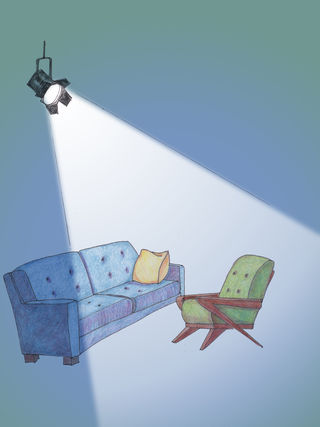Environment
How to Choose the Best Therapist for You
Tips to help you "audition" potential psychotherapists.
Posted July 24, 2018

As I discuss in my book, The Performing Art of Therapy (Routledge), choosing the right psychotherapist for you is like casting the right actor for a production. You want to look for someone who is not only qualified for the job, but is also someone with whom you’d like to spend a good deal of intimate time. Here are a few guidelines to help with the casting process:
- Trust. Whatever form of research you do to locate the right therapist, keep in mind that you want someone who will make you feel safe enough to process some of the most challenging emotional conflicts of your life. Before you begin your casting call, determine what you need from your prospective scene partner in order to trust them with the most vulnerable versions of yourself.
- Talk. Ask friends, family members, colleagues, doctors, and local baristas about the therapists with whom they have worked. No consumer research beats a live, personal narrative. This form of referral gives you an implicit, emotional sense of the environment each therapist/clinical performer creates for their clients, and whether or not that might be a good fit for you. Pay attention not only to what the people you ask say about their therapists, but also observe what they do not say (e.g., their tone of their voice, the expression on their face, and the look in their eyes).
- Browse. Online therapist listings like Psychology Today's will give you an idea of a clinician’s training, credentials, and areas of specialization—all of which are important for you to know. But perhaps more importantly, you want to look for any clues as to what it might be like to sit and talk to that person. What do their photographs say to you? What does their voice sound like in articles or blog posts they have written? What does their literal voice sound like in podcasts or other recordings? What do their values and interests seem to be, and how might that affect the way you relate to each other? How might this person see you as a social, relational being—and not just as a “mental health patient”?
- Meet. Once you’ve narrowed down the short list of therapists you are considering, arrange to meet them—in the casting process, this is called an audition. Many therapists offer a free phone consultation to give you an opportunity to ask them questions and, more significantly, to discover how you feel talking to them. At this stage, it’s important to ask yourself if this is someone with whom you’d like to enter into the unknown on a deeply personal, transformative voyage. If so, give yourself the opportunity to try a few sessions. Challenge yourself to work through the initial fears and obstacles of staying present with the therapist you have chosen. The choice is always yours to continue working with that clinician or to give someone else a try. But keep in mind that, much like the art of acting, the art of therapy is not simply intended to validate who you think you are, but also to help you expand the possibilities of who you can be.
Facebook image: George Rudy/Shutterstock


